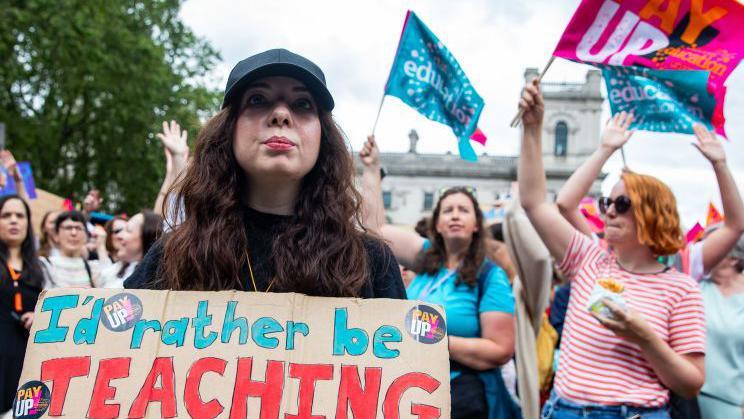Teachers could strike in September, union says

- Published
Teachers in England and Wales could strike again over pay, in September, the National Education Union has said.
Members debating pay, on Thursday, are expected to vote on whether to hold a formal strike ballot.
But the NEU leadership could call such a ballot even without that backing. And a strike would then require a majority in favour, on a turnout of at least 50%
The Department for Education in England said further strikes would "cause more disruption to pupils".
Teacher across the UK went on strike last year, including eight days by NEU members in England.
PE teachers retrain in maths to fill school gaps
- Published20 March 2024
Teacher strikes end as unions accept pay deal
- Published31 July 2023
Speaking at the NEU's conference, in Bournemouth, general secretary Daniel Kebede said there was "more and more frustration developing amongst" teachers.
"My view is if there is a decision to go for a formal ballot, we should conduct that over a fairly significant period of time, looking to take action in September," he said.
Members have already been asked if they would strike for a fully funded above-inflation pay rise, as part of an informal consultative ballot in recent weeks.
And in England and Wales, most responded, with about 90% saying they would be prepared to strike - a result Mr Kebede called "exceptionally significant", adding England's Education Secretary, Gillian Keegan, "has to take that seriously".
NASUWT, the Teachers' Union, also held an informal consultative ballot, in England - but 78% of those who voted rejected a formal ballot.
General secretary Patrick Roach told its conference, in Harrogate, N Yorks: “Our members have weighed that up and their priority right now is not about causing more disruption to lives that are already in tumult, but actually saying we need a government that's on the side of teachers and on the side of children and young people.”
The union would be "looking carefully at how the government responds" to calls for a pay rise, he said, adding: "2023 was a year of action - this must be the year of change."
Retaining staff
Strikes in England ended last year, after all four teaching unions accepted the government's 6.5% pay rise, in July.
The starting salary rose to £30,000, last year - but experienced teachers' pay this school year remains 12% lower than in 2010-11, once rising living costs are taken into account, according to the National Foundation for Educational Research.
And unions have continued to call for a fully funded above-inflation pay increase this year, to help tackle difficulties recruiting and retaining staff.
No formal offer has been made for teachers' 2024-25 pay award in England or Wales.
In England, the School Teachers' Review Body is expected to give its recommendation this term.
'Austerity agenda'
In a letter to the STRB, last month, Ms Keegan said she supported a return of teacher pay awards this year "to a more sustainable level than the previous two historically high pay awards".
The DfE said the unions "should engage" with the STRB process "instead of striking before they even know what the pay recommendations are".
Overall school funding was rising to more than £60bn in 2024-25 and teachers had "already benefitted from two historic pay awards totalling over 12% in just two years".
A Welsh government official said “the UK government’s austerity agenda places significant pressure on all budgets” and “meeting the cost of the teachers’ pay award should be considered in this context”.